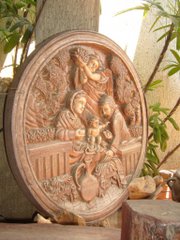As a consequence of sparring with a new badminton crew, I perchanced to have met a new friend. He told me during our break time, that he has a child with special needs. As I dug deep into my nursing experience and theoretical training, when people use the phrase "child with special needs" they usually refer to children with autism. True enough, he told me that she's non-verbal and is undergoing intensive therapy on a regular basis.
And then he said this after telling me much of his story: "Actually, I won't be the person I am now if she hadn't been made part of my life.".
Now that got me to thinking. Provided that I'm taking up my Masters, it's been three days now since I started intensively studying my books on Theoretical Nursing, coming across words like cognition, developmental theories, systems theories, adaptation, cultural vs inherent capacity. My mind was flooded with interconnecting thoughts, these things are finally making sense to me, but before I share those thoughts. Let's go back to my new friend.
Given that I suffer from really bad muscle cramps when I exercise, I like to take breaks in between playing. During one break time, I crack open my new pretty red book, Mark Haddon's the Curious Incident of the Dog in the Night-time. I've been lagging on my leisurely reading lately as the school and work load take priority on the read list. Then as I was reading it, my new friend says to me, "Hey, I know that book. Do you know he's autistic?". I said, "Huh, the lead guy in this book's autistic?". He said, "Yeah.".
Again, my brain flooded with thoughts. I just thought that the lead character in this book was an ordinary guy, only eccentric and a little off from the ordinary norms. Come to think of it, quite simply phrased, a guy with special needs. In this book, the lead character's been trying to figure out who killed his neighbor's dog as such revealing an unusual perspective on life and things, like an aversion to all things yellow, preference of odd numbers over even and a systemic discomfort with new experiences and new faces.
Come to think of it, don't we all have special needs? Like me for example, I believe that my body needs more exercise than other people, hence, if I don't exercise (run, go to the gym, play badminton), I tend to gain weight, feel the back pain that resulted from an injury I've suffered a couple of months back and and consequently laze more than usual. I need the jolt of endorphins to get me going through my days to maintain some semblance of being healthy. So that's my special needs. We all have special needs, and autistic children are no different from us -- the so-called "normal" people.
I've always subscribed to Neuman's Systems Theory in my practice of nursing. People generally develop a core that they protect with lines of defenses against stressors and external threats. These lines are influenced by their genetic makeup, developed perspective of life, adherence to cultural norms and inherent stability.
So when you apply this to children with special needs, these kids develop differently from the norm because they were born with a different set of tools to begin with. They build their lines of defenses and strengthen a core that varies from the accepted "normal". The environs often are asked to maintain congruence with children of special needs instead of the other way around. Parents and caretakers mold the environs a little different in order for the children to thrive. I recently watched an episode of Maricel Laxa-Panganiban's Momworks where these children were featured. One guest explained how her family's life and dynamic were completely changed by having a son with special needs. Her life wasn't delimited but rather enhanced and made better by her son. She is one proud mother, perhaps as proud as any other mother of every other child. She learned from her son the power of life, how it can be made special no matter how unusual the circumstances are for her fmaily. Having a special needs child doesn't necessarily equate to difficulty, rather it denotes opportunity to be great in spite of apparent difficulty.
Children are engaged in life through their parents. Guided and allowed to grow under the care of adults, children often reflect their caretakers and mirror, they become little versions of their parents. Too often though, parents will succumb to the reality that these children, the very children they are expected to mold, mold them to be better versions of themselves. The circle of life continues on.
Monday, August 9, 2010
Subscribe to:
Post Comments (Atom)













No comments:
Post a Comment